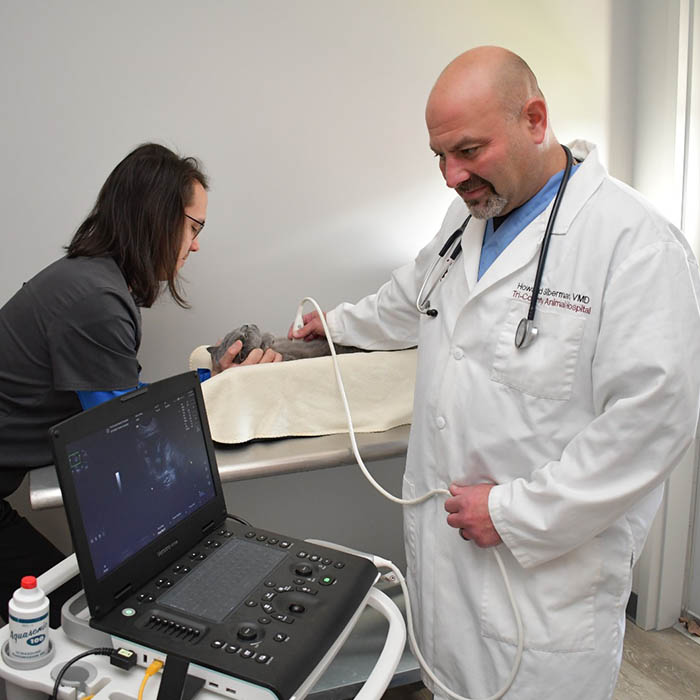Checking Out the Necessary Solutions Supplied by a Veterinary Cardiologist: Comprehending Ultrasound and CT Check Techniques
Veterinary cardiologists play a vital duty in the health and wellness of family pets by detecting and dealing with various heart disease. They make use of advanced imaging techniques, such as cardiac ultrasound and CT scans, to provide precise analyses. Each technique has its distinctive advantages and applications. Comprehending these methods is vital for pet dog proprietors looking for the most effective care for their friends. What elements should family pet owners think about when choosing in between these analysis devices?

The Role of Veterinary Cardiologists in Pet Health Care
Vet cardiologists play an essential role in the medical care of pet dogs, concentrating particularly on detecting and treating heart-related problems. They have specialized training that allows them to translate complex analysis tests and identify various cardiovascular issues. These experts make use of innovative techniques, such as echocardiography and electrocardiography, to evaluate heart function and structure accurately.Veterinary cardiologists also develop customized therapy strategies that might consist of medicines, way of life adjustments, and, in many cases, surgical interventions. Their experience extends to enlightening animal owners regarding heart wellness, highlighting the relevance of regular exams and very early detection of prospective issues. Partnership with basic veterinarians is crucial, as it assures extensive take care of pets with suspected cardiac problems. By offering specialized services, veterinary cardiologists significantly improve the lifestyle for family pets and provide peace of mind for their owners, strengthening the relevance of heart health in total family pet wellness.
Typical Heart Issues in Pets
Common cardiac issues in animals can significantly affect their health and lifestyle. Heart murmurs, various sorts of cardiomyopathy, and genetic heart flaws are amongst one of the most common conditions that vets run into. Board Certified Veterinary Cardiologist. Comprehending these issues is important for family pet owners to assure timely medical diagnosis and appropriate treatment
Heart Murmurs in Pets
Heart murmurs can be a source of issue for pet proprietors, they are not constantly indicative of severe health and wellness concerns. A heart murmur is an abnormal audio generated by stormy blood flow within the heart. In animals, these whisperings can be triggered by different variables, including hereditary heart flaws, shutoff issues, or perhaps tension during exams. Many family pets with heart whisperings lead normal lives without considerable health influences. To identify the underlying reason, vet cardiologists often utilize diagnostic strategies such as echocardiograms and Doppler ultrasounds. Early detection and analysis are vital, as they may help take care of any type of prospective cardiac issues successfully. Pet dog proprietors are motivated to consult their vet for a comprehensive evaluation if a heart whispering is identified.
Cardiomyopathy Kind Explained
Cardiomyopathy encompasses a group of diseases influencing the heart muscle, causing endangered cardiac function in pets. One of the most typical kinds include expanded cardiomyopathy (DCM), hypertrophic cardiomyopathy (HCM), and limiting cardiomyopathy (RCM) DCM largely influences dogs, creating the heart to damage and increase the size of, which reduces its ability to pump blood properly. On the other hand, HCM is more prevalent in felines, characterized by the enlarging of the heart wall surfaces, often causing blocked blood flow. RCM, though much less common, takes place when the heart muscle comes to be rigid, limiting its capacity to loaded with blood. Each type provides one-of-a-kind obstacles in medical diagnosis and treatment, necessitating specialized vet cardiological assessment to ensure peak administration and treatment for influenced pets.
Genetic Heart Flaws
Hereditary heart defects stand for a considerable category of heart concerns in pets, distinct from obtained conditions such as cardiomyopathy - Board Certified Veterinary Cardiologist. These issues are structural problems present at birth, affecting the heart's typical feature. Common types include license ductus arteriosus, ventricular septal defects, and pulmonic stenosis. Signs and symptoms might differ commonly, ranging from light to serious, and can consist of exercise intolerance, coughing, and difficulty breathing. Early medical diagnosis via sophisticated imaging methods like ultrasound is crucial for efficient management. Vet cardiologists play an important role in recognizing these problems and suggesting proper treatment options, which may consist of clinical monitoring or surgical intervention. Identifying genetic heart defects enables better outcomes and enhanced quality of life for impacted pet dogs
Understanding Cardiac Ultrasound: How It Functions
A significant variety of vet methods currently use heart ultrasound as an essential diagnostic tool for assessing heart health and wellness in pets. This non-invasive strategy uses high-frequency acoustic waves to create pictures of the heart's framework and function. Throughout the procedure, a vet technician uses a gel to the pet's chest and makes use of a transducer to release ultrasound waves. These waves jump off the heart and bordering structures, producing real-time images on a monitor.Veterinarians can examine numerous elements of cardiac health, including chamber size, wall activity, and valve feature. Furthermore, heart ultrasound enables the discovery of abnormalities such as liquid build-up and congenital heart flaws. This technique is vital for identifying problems that might not be noticeable through standard radiographs. By giving comprehensive This Site information about the heart's anatomy and performance, heart ultrasound aids in developing efficient therapy strategies for animals struggling with heart illness.
The Importance of CT Scans in Identifying Heart Conditions
Just how do CT scans boost the medical diagnosis of heart problems in vet medicine? CT scans provide in-depth cross-sectional photos of the heart and surrounding frameworks, enabling veterinarians to envision intricate physiological connections. This imaging strategy is specifically valuable in identifying congenital heart issues, cardiac tumors, and problems in capillary. By using sophisticated imaging algorithms, CT scans can evaluate heart chamber sizes and feature, supplying an extensive sight that might be challenging to attain with typical methods.Additionally, CT angiography can visualize blood flow and determine areas of constriction or blockage, which is necessary for planning potential treatments. The rate and accuracy of CT scans also help with quick medical diagnoses, vital in emergency scenarios. Inevitably, the unification of CT scans right into vet cardiology substantially enhances the precision of diagnoses, allowing targeted therapy plans and enhancing patient end results for pets experiencing heart conditions.
Contrasting Ultrasound and CT Scan Strategies
While both ultrasound and CT scans are vital tools in vet cardiology, they provide distinct advantages and limitations that influence their use in identifying heart disease. Ultrasound, or echocardiography, supplies real-time imaging of the heart's structure and function, permitting veterinarians to assess heart chambers, valves, and blood flow. It is specifically effective for examining conditions like congestive heart failure and cardiomyopathy. Ultrasound might be restricted in visualizing particular anatomical frameworks due to person size or obesity.In comparison, CT scans deal thorough cross-sectional pictures of the heart and surrounding tissues, making them optimal for determining structural abnormalities, growths, or vascular concerns. CT scans provide extensive insights, they need sedation and may include radiation direct exposure. Inevitably, the option between ultrasound and CT checks depends upon the particular medical circumstance, the person's condition, and the details needed for a precise medical diagnosis.
Therapy Alternatives Available With Vet Cardiology
Vet cardiology offers a series of treatment alternatives tailored to address numerous heart disease in pets. Treatment plans frequently begin with lifestyle alterations, including diet regimen modifications and exercise modifications, targeted at enhancing overall heart wellness. Medications play a crucial role, with cardiologists suggesting medications such as diuretics, beta-blockers, and ACE preventions to enhance and take care of signs and symptoms heart function.In more extreme situations, interventional procedures, such as balloon valvuloplasty or stent placement, may be necessary to reduce clogs or improve blood circulation. For sure congenital heart issues, surgical alternatives may be explored to remedy structural issues. Additionally, ongoing tracking and follow-up care are vital parts of a comprehensive therapy plan, permitting prompt adjustments based upon the family pet's feedback to therapy. Generally, vet cardiology concentrates on providing reliable, customized like optimize the health and wellness and well-being of pet people with heart disease.
Exactly how to Prepare Your Animal for a Heart Evaluation
Preparing a pet dog for a heart analysis is important to ensure exact results and a smooth procedure. Owners ought to first set up the visit with the veterinary cardiologist and go over any kind of details needs or problems. It is suggested to hold back food for at the very least 12 hours prior to the evaluation, as this helps boost imaging top quality during procedures like ultrasound or CT scans.Additionally, keeping a calm environment on the day of the appointment can help in reducing the animal's stress and anxiety. It is advantageous to bring along any kind of pertinent clinical YOURURL.com records, including previous tests and medications (CT Scans For Animals). Proprietors should additionally make certain that their family pet is comfy and leashed throughout transport to the center. Familiarizing themselves with the evaluation procedure can minimize worries and aid in asking notified questions during the consultation. By complying with these actions, owners can add significantly to the effectiveness of the cardiac assessment
Regularly Asked Questions
How much time Does a Heart Ultrasound or CT Scan Take?
The duration of a heart ultrasound normally ranges from 30 to 60 mins, while a CT scan might take around 15 to 30 mins. Aspects such as the individual's condition can influence these time price quotes.

Are There Any Type Of Risks Related To These Diagnostic Treatments?

Can I Stick With My Family Pet Throughout the Treatment?
The veterinary facility's plan usually dictates whether pet dog proprietors can stay during treatments. While some clinics urge owner presence for comfort, others may call for separation to assure security and perfect conditions for analysis imaging.
Exactly how Much Do These Diagnostic Examinations Usually Cost?
The prices of diagnostic examinations, such as ultrasound and CT scans, normally differ based on location and center. Usually, costs range from a couple of hundred to over a thousand dollars, mirroring the intricacy and technology entailed.
What Is the Recuperation Process After a Cardiac Analysis?
The recuperation procedure after a cardiac assessment involves checking the pet for any type of immediate responses, ensuring convenience, and limiting exercise. Veterinarians generally give post-evaluation instructions to assist animal proprietors throughout this vital recovery duration. Heart whisperings, various types of cardiomyopathy, and genetic heart defects are amongst the most prevalent conditions that veterinarians run into. A heart read this post here whispering is an unusual audio produced by unstable blood circulation within the heart. Cardiomyopathy encompasses a group of illness influencing the heart muscle, leading to endangered heart function in pet dogs. Congenital heart problems stand for a significant classification of heart problems in family pets, unique from gotten problems such as cardiomyopathy. Ultrasound, or echocardiography, supplies real-time imaging of the heart's framework and function, enabling veterinarians to examine heart chambers, shutoffs, and blood circulation.
Comments on “When Should You See a Board Certified Veterinary Cardiologist for Your Pet?}”